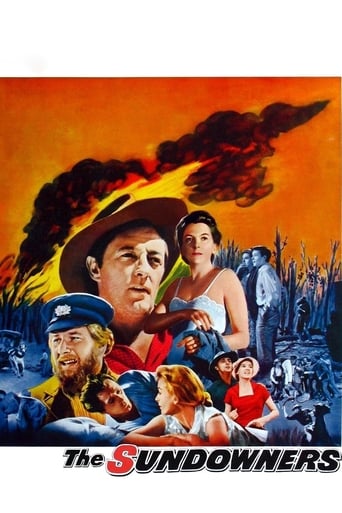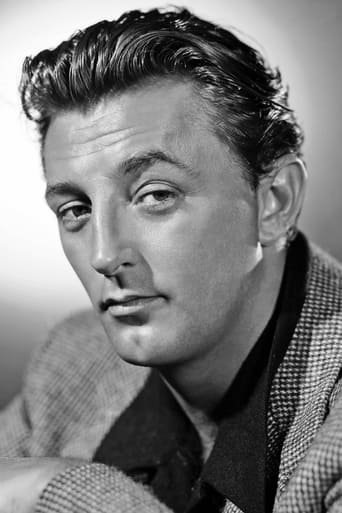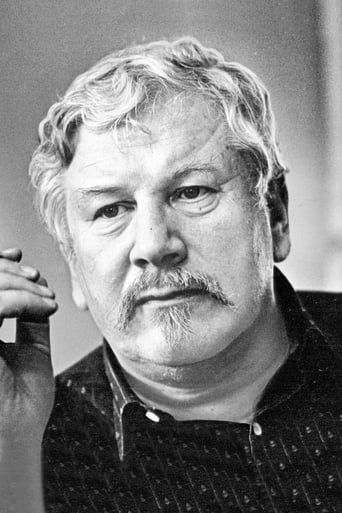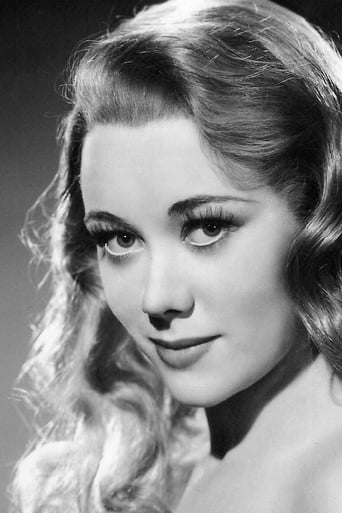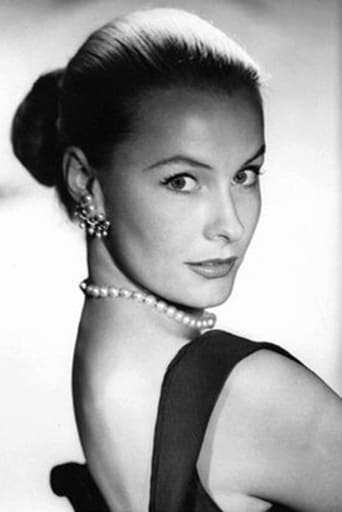Odelecol
Pretty good movie overall. First half was nothing special but it got better as it went along.
Ketrivie
It isn't all that great, actually. Really cheesy and very predicable of how certain scenes are gonna turn play out. However, I guess that's the charm of it all, because I would consider this one of my guilty pleasures.
Janae Milner
Easily the biggest piece of Right wing non sense propaganda I ever saw.
billcr12
I recently watched Heaven Knows Mr Allison and Kerr and Mitchum made a great team. They were reunited three years later for this Australian family adventure. My taste in movies is usually of the more vicious type of film, such as Pulp Fiction or Reservoir Dogs, and so The Sundowners is strange departure for me. I normally despise Pollyanna styled story lines but I am such an admirer of Robert Mitchum that I gave this one a shot. I was not disappointed in the least as the usually bad tempered actor plays a man prone to wandering with his wife and son throughout Australia's outback and working transient jobs, including one as a sheep shearer. He shows perfect comedic timing and Kerr is excellent as his long suffering wife. Peter Ustinov and Glynis Johns add even more substance to an awesome cast. I have added this film to my favorite of Mitchum,s, along with Cape Fear and Night of the Hunter.
marcslope
Absolutely lovely movie, leisurely, diverting, full of character, in dazzling Technicolor, featuring beautiful Australian locations and a perfect Dmitri Tiomkin score. But first and foremost, a study of an imperfect but very worth-maintaining marriage. Watch how Mitchum and Kerr (who had enjoyed working together on "Heaven Knows, Mr. Allison") react to each other, their body language alone speaking volumes, their eyes speaking more. Their accents are secure, too, and Michael Anderson, Jr., as their son, is no cloying kid actor but a real actor, natural and intuitive and quite believably their progeny. No real villains in this one and not a great deal of story, but a gorgeous series of set pieces, touching and winsome. A full meal.
dbdumonteil
In "Heaven knows ,Mister Allison" ,Robert Mitchum and Deborah Kerr had a tiny island for themselves ;in "the sundowners " they have the whole Australia.Mrs Carmody wants to settle down ,she wants a home ,she wants her boy to go to school.Mr Carmody registers the same desire ,but always something happens.This family and their friend (Peter Ustinov) are very endearing characters and as you follow them in their two hours + journey ,you never get bored a single minute.And however ,it's not an action-packed story ,all that happens could happen in real life and this simple life is depicted with respect for the audience.The documentary side is very interesting.
Steffi_P
Mild-mannered dramas such as this have never been too common, not just because commerce-savvy producers don't like to gamble on them, but also because they are tough to get right. In the late 50s and 60s however director Fred Zinnemann was making a fair few of them, and gaining respect within the industry as he did so. He is perhaps the only Hollywood filmmaker of any generation who could really thrive on this kind of picture. But what really determined whether a Zinnemann picture was going to be a success or a failure was the suitability of the cast.What pictures like this don't need is the passionate, dedicated acting of the young "method" followers - too much power and presence. But neither do they need the likability and restraint of, say, James Stewart or Gary Cooper - not real enough for this world. No, a picture like this is only suited to players who strike that balance between expressiveness and believability. So thank goodness we have Deborah Kerr and Robert Mitchum, performers do not claim to become their characters, but simply play them with sincerity. And thank goodness for Peter Ustinov and Glynis Johns - animated eccentrics, but in a way that seems natural, so you could almost believe they were well-meaning members of the public who wandered onto the set and were given a job out of sympathy. These people are not likable in the manner of familiar screen personalities, but they are likable in the way that real people in our lives could be, and it is this factor that gives their fairly mundane story its appeal.The 1950s had seen Zinnemann's transition from extrovert expressionist to sensitive impressionist. Rather than roughly forcing us to take on the protagonists point-of-view with subjective camera angles and mood-based lighting schemes, he now gently encourages us to see the world the way the characters do. He begins the Sundowners by immersing us in the beauty and harmony of the outdoors, with tiny patterns of movement that are common to almost all of his pictures - trees standing proud in a caressing breeze, horses idly flicking their tails. He devotes an unusual amount of time to shots irrelevant to the narrative, taking time to admire the beauty of a scene or follow creatures scurrying through the bush. This broad focus gives us the feeling that the Carmodys are simply a part of this environment. In the outdoor scenes there are a great deal of pans and sideways tracking shots, keeping up the feel of people always on the move. And some of these are fantastically well-timed, such as the sharp pan as Robert pulls up just after Kerr has been watching a well-to-do woman applying makeup.But even the most mild-mannered drama cannot exist without some conflict. The conflict in the Sundowners is never the subject of a major scene or confrontation; it is played out in quiet, by-the-way moments, and mostly upon the face of Deborah Kerr. Although she and Mitchum are both leads, and in fact Mitchum probably has the more lines and screen time, Kerr's character is at the dramatic heart of the story. Scenes like the fistfight or the sheep-shearing contest are simply diversions - it is Ida's frustration at being torn between loyalty to her husband and her own desire to settle down and have a real home that really drives the plot forward. Isobel Lennart's screenplay cleverly hides her struggle in amongst all the scenes of humour and warmth so as not to unbalance the overall feel of the picture. And Zinnemann is smart enough to draw this strand of the story out, treating Kerr to close-ups at key moments, keeping her held in unbroken takes in the rare moments of stillness. Most of all however we have Kerr's own performance, a little against type but probably closer to the woman she was in real life. In keeping with the character, her words and movements are simply getting on with the business of living, and yet she provides a subtle commentary on proceedings with her face. It is her contribution more than anyone else's that brings together the two threads of the Sundowners - the straightforward depiction of life as it happens and a direct and involving emotional honesty.
